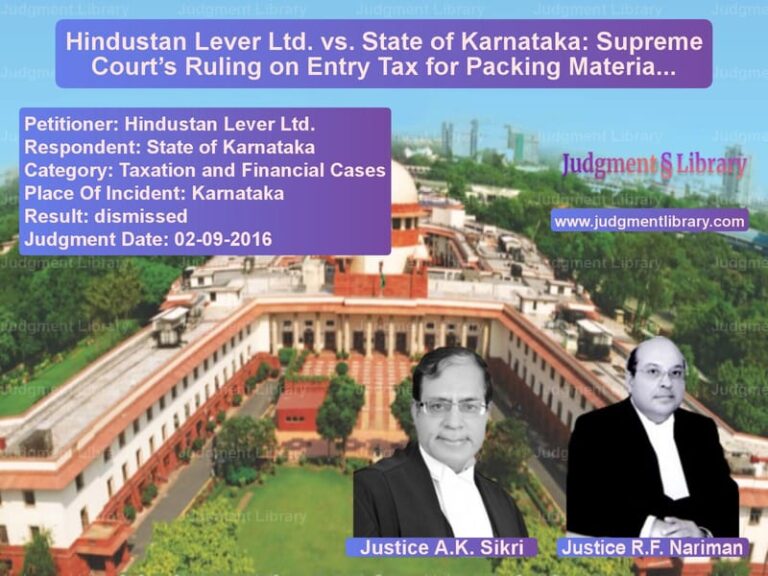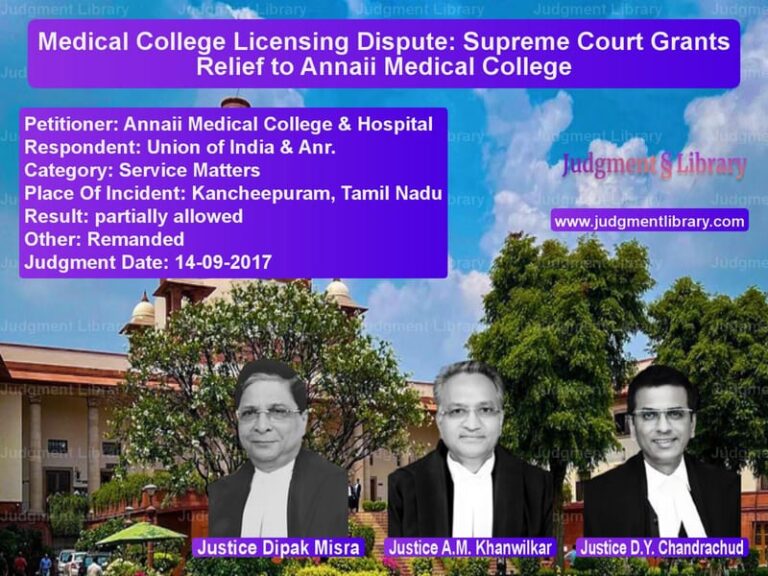Supreme Court’s Ruling on Employee Seniority and Promotion in Inter-Company Transfers
On 25th September 2018, the Supreme Court of India delivered a crucial judgment in Coal India Ltd. & Anr. v. Navin Kumar Singh, a case concerning employee seniority and eligibility for promotion after an inter-company transfer within a corporate group. The ruling clarified whether an employee’s past service in the parent company should be counted for promotion eligibility after transferring to a subsidiary company. The Court ultimately held that while seniority may be reset upon transfer, past service should still be considered for promotion eligibility. This case set an important precedent for employment law and service matters in India.
The case was brought before the Supreme Court after a long legal battle initiated by the respondent, Navin Kumar Singh, who argued that he was unfairly denied promotion due to a misinterpretation of the company’s inter-company transfer policy. The judgment not only clarified the rights of employees seeking transfers but also reaffirmed principles of fairness in public sector employment.
Background of the Case
The respondent, Navin Kumar Singh, was originally appointed on 27th June 1990 as a Chemical Engineer (E-2 Grade) in Dankuni Coal Complex (DCC), a unit of Coal India Ltd. On his request, he was transferred to Central Mine Planning and Design Institute Limited (CMPDIL), a subsidiary of Coal India Ltd.
When the respondent applied for a promotion to E-3 Grade in 1993, his claim was rejected on the grounds that his service at DCC would not be counted for eligibility. This decision significantly affected his career progression, leading him to challenge the company’s stance on inter-company transfers and promotions.
Legal Issues and Key Questions
The case raised crucial questions about the rights of employees who voluntarily transfer within a corporate group:
- Does an employee lose all past service benefits upon an inter-company transfer?
- Can an employee’s seniority be reset while still maintaining past service for promotion eligibility?
- Does denying past service for promotion eligibility violate employment rights?
Arguments by the Petitioner (Coal India Ltd.)
Coal India Ltd., the appellant, argued that:
- The transfer of the respondent to CMPDIL was at his own request, making it a personal transfer.
- The company policy stated that an employee transferred at his own request must lose his past seniority in the new company.
- The Office Memorandum dated 5th June 1985 clarified that employees who opt for inter-company transfers should not expect any benefits from their previous service.
- The respondent had not completed the required three years of service in CMPDIL when he applied for promotion.
- Allowing transferred employees to retain past service for promotion eligibility would cause an unfair advantage over existing employees in the new company.
Arguments by the Respondent (Navin Kumar Singh)
The respondent countered these arguments by stating:
- While he agreed to lose seniority upon transfer, his past service should still count for promotion eligibility.
- There was no provision in the company’s policy that explicitly stated that past service should be ignored for all purposes.
- The policy only affected seniority, not eligibility for career progression.
- The High Court had ruled correctly by distinguishing between seniority and length of service.
- Legal precedents such as Union of India v. C.N. Ponnappan and Scientific Advisor to Raksha Mantri v. V.M. Joseph supported his position.
Supreme Court’s Observations
The Supreme Court, comprising Chief Justice Dipak Misra, Justice A.M. Khanwilkar, and Justice D.Y. Chandrachud, carefully examined the legal and policy framework governing the case.
Key observations included:
“On a fair reading of clause 11 of the policy, there is nothing to indicate that the transferee would lose his past service rendered in the parent company for all purposes.”
The Court further clarified:
“The policy of forfeiture of seniority applies only to inter-company transfers on personal grounds to ensure fairness to existing employees. However, it does not affect an employee’s eligibility for promotion.”
Additionally, the Court relied on the decision in C.N. Ponnappan and V.M. Joseph to reinforce that:
- Seniority and eligibility for promotion are separate considerations.
- An employee’s past service should count for promotion eligibility.
- The denial of past service benefits for promotion would be unjust.
Final Judgment
After reviewing the facts and legal arguments, the Supreme Court ruled in favor of the respondent:
“The service rendered by the respondent in DCC shall be counted towards determining eligibility for promotion to E-3 Grade.”
The appeal by Coal India Ltd. was dismissed, and the respondent’s notional promotion date was revised to 12th November 1993.
Impact of the Judgment
This ruling set an important precedent in Indian employment law by clarifying that inter-company transfers should not unfairly disadvantage employees.
Key takeaways include:
- Seniority and eligibility are distinct: While transferred employees may lose their original seniority, their past service should count for promotion.
- Employer policies must be fair: Companies must ensure that transfer policies do not impose undue hardships on employees.
- Legal protection for employees: Employees who transfer within an organization’s subsidiaries should not be arbitrarily denied benefits.
The judgment reaffirmed that employment policies must be interpreted fairly to protect employees from unjust disadvantages in their career growth.
Petitioner Name: Coal India Ltd. & Anr..Respondent Name: Navin Kumar Singh.Judgment By: Justice Dipak Misra, Justice A.M. Khanwilkar, Justice D.Y. Chandrachud.Place Of Incident: Jharkhand.Judgment Date: 25-09-2018.
Don’t miss out on the full details! Download the complete judgment in PDF format below and gain valuable insights instantly!
Download Judgment: Coal India Ltd. & An vs Navin Kumar Singh Supreme Court of India Judgment Dated 25-09-2018.pdf
Direct Downlaod Judgment: Direct downlaod this Judgment
See all petitions in Promotion Cases
See all petitions in Employment Disputes
See all petitions in Public Sector Employees
See all petitions in Judgment by Dipak Misra
See all petitions in Judgment by A M Khanwilkar
See all petitions in Judgment by Dhananjaya Y Chandrachud
See all petitions in dismissed
See all petitions in supreme court of India judgments September 2018
See all petitions in 2018 judgments
See all posts in Service Matters Category
See all allowed petitions in Service Matters Category
See all Dismissed petitions in Service Matters Category
See all partially allowed petitions in Service Matters Category







